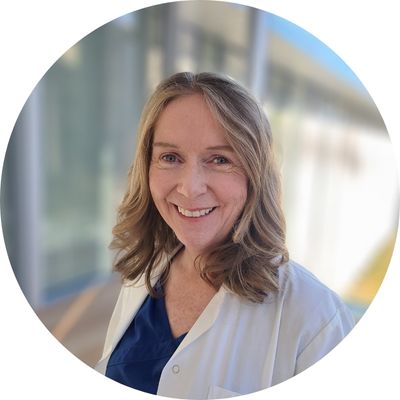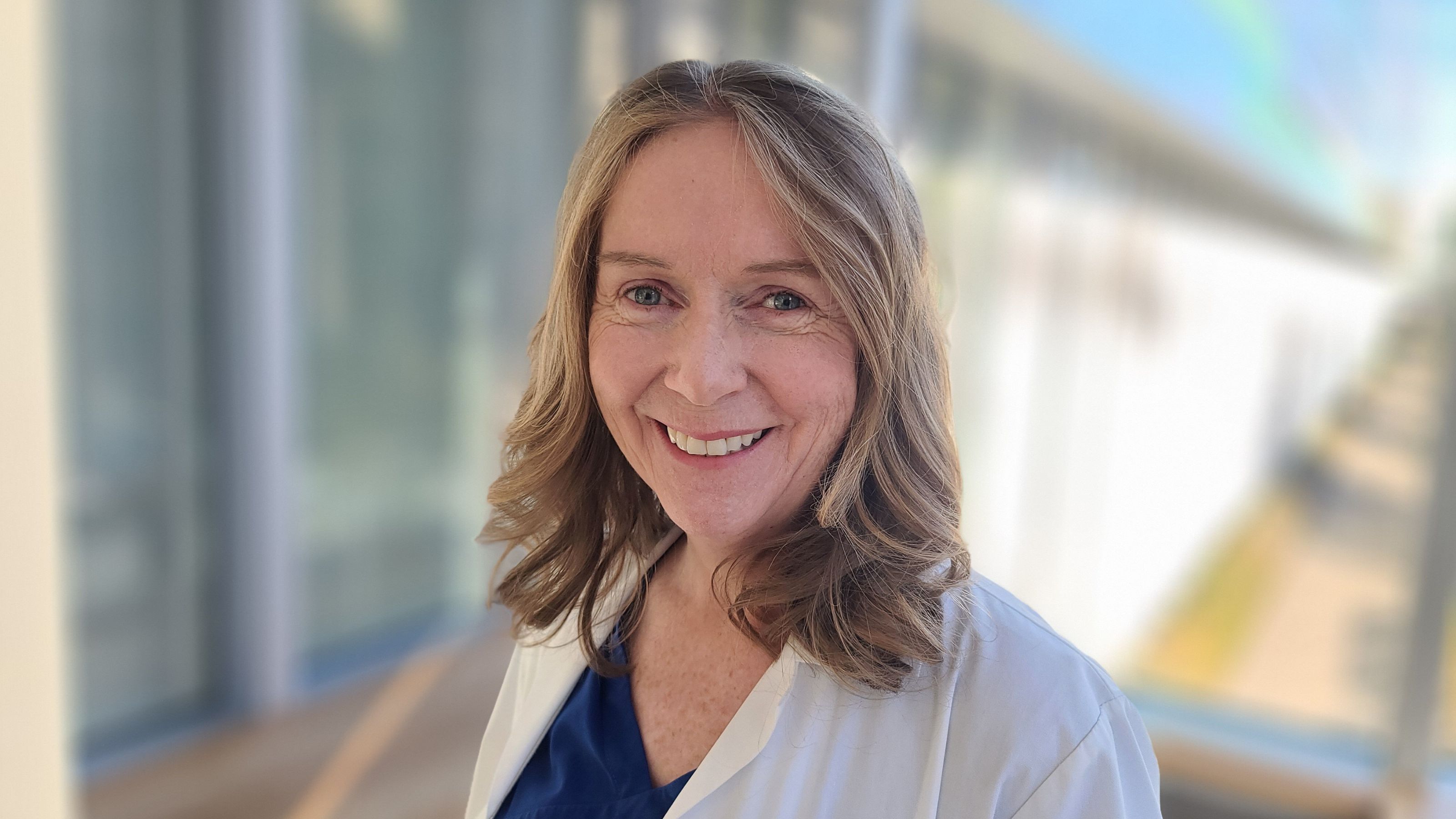Dr. Anthea Senior, associate professor in the School of Dentistry in the Faculty of Medicine & Dentistry, shares how reassessing current practices, incorporating feedback and collaborating together can lead to meaningful changes that support students in becoming confident, competent and responsible clinicians.
In this week’s spotlight, Anthea shares how challenging the status quo and taking informed risks can significantly improve patient care and support a successful dentistry training journey for students.
How do you describe your work to people who don’t work in your field?
I’m a dentist but unlike most dentists who work in dental offices, I spend my time teaching students how to take and interpret dental x-rays. I also lead the clinical curriculum of the Doctor of Dental Surgery (DDS) program at the U of A and ensure that students have the skills and experiences to be ready to graduate.
What’s one big problem you want to solve through your work?
Keeping the dental curriculum current, relevant and evolving is challenging. We made tweaks to the DDS curriculum over the years, however in 2015 we embarked on a major transformation with a complete redesign from the ground up. Various reasons led us to this decision including feedback from students who shared that they didn’t feel like they were in the dentistry program in their first two years of training. They also indicated that they would like some earlier clinical experiences.
When we implemented our new dental curriculum in September 2019, we implemented some new shadowing experiences for the first- and second-year students. However, the arrival of the pandemic in early 2020 provided a catalyst for us to do more. Additional infection prevention and control measures were required which included the use of high-volume evacuation for aerosol generating procedures. We quickly realized that to enable our final-year students to have sufficient clinical experiences to graduate on time, that we needed the junior students to become part of the clinical team and assist chairside with patient care. This is how the co-learning initiative started.
What does the word “innovation” mean to you?
To me it means challenging the status quo and being prepared to take a risk, (albeit a calculated one and situation dependent), when the likelihood is that the positives will surpass the negatives. It also involves recognizing that when something is truly innovative that there will be unknowns. Provided the project can safely adapt and respond to them, the unknowns should not overwhelm or distinguish the innovation.
Prior to providing patient care, students had extensive training in infection prevention control and some training in chairside assisting and mentorship. However, there still were some significant unknowns. Could new dental students adapt to a clinical environment so early on in their training? Would having the co-learners help or hinder the senior students? What would patients think, would the standard of patient care be impacted? Having junior students involved with patient care to this extent so early on in their training, to the best of my knowledge, has not occured in other dental schools. So, we were treading new ground and taking a risk.
What’s been your biggest a-ha moment — in life or work — so far?
Anybody who knows me, knows that I am a planner so the continual changes, uncertainties and unknowns of the last two years have certainly been difficult. However I think it's made me more aware that when faculty and staff work together to solve problems, particularly during challenging circumstances, “silver linings” can emerge that not only allow us to survive a crisis but thrive.
The co-learning project reinforced for me not to underestimate what first- and second-year dental students can do, especially in regards to adapting to the clinical environment and making a positive contribution to patient care. They rose to the challenge, accepted the responsibility and learned quickly. Their confidence and familiarity with the clinical setting greatly improved and the transition to providing complete patient care in their third year is now much smoother. Senior students have been able to be more efficient with their time chairside and, last but not least, patients have reported enjoying chatting with the junior students, particularly as they can put them at ease by talking about things unrelated to dentistry! The co-learning pilot has been so successful that it is now part of our new curriculum and is a component of all first and second clinical courses.
How do you or your team come up with your best ideas?
As the majority of my time is spent teaching in labs, classroom and patient care clinics, finding time to innovate can be challenging. I come across a range of very different issues on a daily basis and identifying where best to concentrate my efforts can be difficult. This is when making time to meet with colleagues to prioritise common concerns and brainstorm together is time well spent. Not only does it result in a better plan or solution than I would have come up with alone, the collaborative approach facilitates the acceptance and implementation of the changes.
What’s your favourite thing about working at the U of A?
I enjoy interacting with the university community. There is such a range of ages and backgrounds and there is always a subject matter expert who you can consult with. The best part of my job is watching how a student develops throughout their four years in the program. There’s nothing like seeing them walk across the stage at graduation. It’s a privilege to teach and play a small part in contributing to the dental professionals of the future.
How does your work, your contributions to innovation help you lead with purpose?
My goal is to help create environments for students, faculty and staff to work together, flourish in their careers and enjoy coming to work. My hope is that U of A dental graduates who were and continue to be supported by the new dental curriculum, will continue to provide excellence in oral health care for their patients and have the job satisfaction that I’ve had in dentistry over the past 30 years.
Do you have a role model at the U of A? How have they influenced you?
I work closely with Dr. Steven Patterson, professor and associate chair in the School of Dentistry in the Faculty of Medicine and Dentistry. Dr. Patterson is a well respected leader in dental education in Canada and led our curriculum renewal process. Despite being one of the busiest people I know, he always prioritises student needs and skillfully handles difficult situations. He is incredibly humble, gracious, thoughtful, patient and non-judgemental. He has a way of making everyone feel valued and appreciated.
What’s next for you? Do you have any new projects on the horizon?
We are at an exciting time in our curriculum renewal process where we now have all four years of dental students in the new curriculum. It’s also time to publish the progress we’ve made, how we facilitated it and if we met our goals. Additionally, I’m looking forward to a radiology research project in the Spring that involves exploring how an online dental-x-ray technique simulator can prepare first-year students for taking dental x-rays.

About Anthea
Dr. Senior joined the University of Alberta in 2003. She is currently the associate chair for DDS Clinical Education and has led the design and implementation of the new DDS clinical curriculum. As an associate professor in radiology at the School of Dentistry, she teaches radiology technique and interpretation in classroom, clinical and laboratory settings and presents on educational research and oral radiology locally and nationally.
Dr. Senior obtained her bachelor of dentistry degree from the University of Newcastle-upon-Tyne in the United Kingdom in 1992. In the following nine years she practiced as a general dentist, providing care to mainly children and special care adult populations in the North East of England. In 2003 she completed a diploma in dental surgery from the University of Bristol (UK) in pediatric dentistry, special care dentistry and oral health and disease.
Find Dr. Anthea Senior on ORCID.
This conversation has been edited for brevity and clarity.
Innovator Spotlight is a series that introduces you to a faculty or staff member whose big ideas are making a big difference.
Do you know someone who’s breaking boundaries at the U of A? (Maybe it’s you!) We’re interested in hearing from people who are creating new solutions to make our world better. We want to feature people working across all disciplines, whether they’re championing bold ways of thinking, driving discovery or translating insights from the lab into the market.
Get in touch at blog@ualberta.ca.
